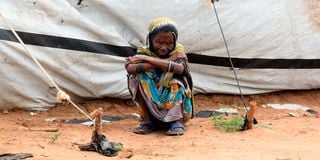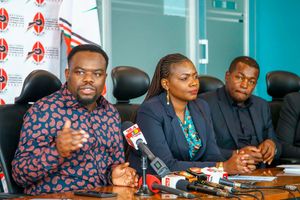International Women’s Day: Invest in refugee and internally displaced women

A woman at Danisa Refugee camp in Tana River on December 21, 2023.
What you need to know:
- International Women’s Day this year comes as Kenya is battling femicide and high cost of living.
- Investing in refugee and IDP women entails promoting their participation in decision-making processes.
It is now 28 years since the adoption of the Beijing Declaration and Platform for Action, a progressive roadmap for gender equality focusing on women empowerment.
International Women’s Day (March 8) is celebrated each year across the world. This year’s theme is "Invest in women: Accelerate progress."
The world is facing crisis in various forms, ranging from geopolitical conflicts to soaring poverty levels and escalating impacts of climate change.
International Women’s Day this year comes as Kenya is battling femicide, high cost of living and unemployment.
It is a day when women are recognised for their achievements without regard to divisions, whether national, ethnic, linguistic, cultural, economic or political affiliation.
It is an occasion for looking back on past struggles and accomplishments, and more importantly, for looking ahead to the untapped potential and opportunities that await future generations of women.
As the world celebrates International Women’s Day, the focus on investing in women takes center stage, echoing the theme of this year's commemoration.
Across the globe, women face multifaceted challenges, but those who are refugees or internally displaced encounter unique obstacles that demand urgent attention.
In Eastern Africa, these women navigate through displacement, insecurity, and limited access to resources, making their empowerment and inclusion paramount to accelerating progress in the region.
Risks of gender-based violence
Eastern Africa, home to millions of refugees and internally displaced persons (IDPs), grapples with protracted conflicts, environmental degradation, and political instability.
Within this context, women bear a disproportionate burden, often facing heightened risks of gender-based violence, economic marginalisation, and limited educational opportunities.
However, despite their adversities, refugee and IDP women demonstrate resilience, resourcefulness, and untapped potential that can drive transformative change if adequately invested in.
Investing in refugee and internally displaced women involves addressing their diverse needs comprehensively.
Firstly, it entails ensuring access to education and skills training programs tailored to their circumstances.
Education not only empowers women with knowledge but also equips them with tools to advocate for their rights, participate in decision-making processes, and contribute meaningfully to their communities' development.
Furthermore, economic empowerment initiatives, including vocational training, microfinance support, and entrepreneurship programs, are essential for refugee and IDP women to achieve financial independence and break the cycle of poverty.
By providing access to economic resources and opportunities, these initiatives enable women to support themselves and their families, fostering economic resilience and sustainable livelihoods.
Addressing their unique health needs
Moreover, investing in the health and well-being of refugee and IDP women is crucial for ensuring their holistic development and empowerment.
Access to comprehensive healthcare services, including reproductive health care, maternal and child health services, and psychosocial support, is essential for addressing their unique health needs and promoting their overall well-being.
Beyond addressing immediate needs, investing in refugee and IDP women also entails promoting their meaningful participation in decision-making processes and leadership roles within their communities and beyond.
By amplifying their voices, advocating for their rights, and challenging discriminatory norms and practices, these women can contribute to shaping policies and programs that address their specific concerns and foster inclusive and sustainable development.
However, meaningful investment in refugee and internally displaced women requires concerted efforts from governments, civil society organisations, international agencies, and the private sector.
It demands the allocation of adequate resources, the establishment of supportive policies and legal frameworks, and the creation of enabling environments that prioritize gender equality, social inclusion, and human rights.
On this International Women’s Day, let us recommit ourselves to investing in refugee and internally displaced women in Eastern Africa and beyond.
By recognising their agency, resilience, and potential, and by providing them with the necessary support and opportunities, we can accelerate progress towards gender equality, empowerment, and inclusive development for all.
As we celebrate the achievements of women worldwide, let us also stand in solidarity with those who continue to overcome adversity and strive for a brighter and more equitable future.
Deraso Dokhole is a lawyer and head of refugee rights at The Legal Caravan





